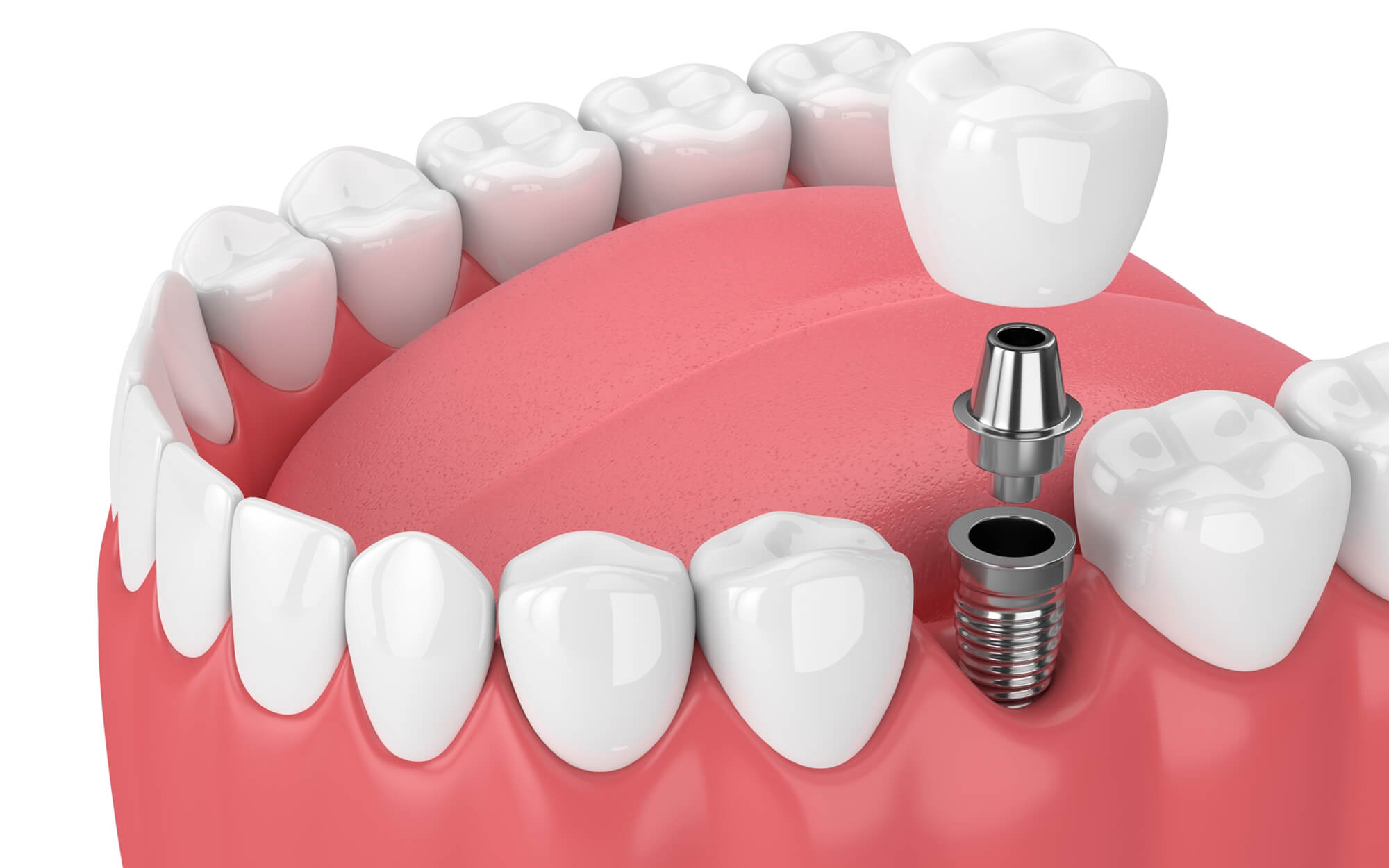Dental Implants are one of the most technologically advanced dental treatment options available today. The introduction of permanently fixed Implants to replace missing teeth has helped to revolutionise dentistry for the better, providing patients with a source of treatment that has enabled them to rebuild confidence with a new smile. A smile which is as close to a natural one as you could probably get. Implants are a viable option, and an alternative to removable dentures, which some patients fail to tolerate well.
Statistics show that Dental Implants have a significantly higher success rate than any other tooth-replacement procedure; with a documented success rate of over 95%.
As Close To Natural Teeth As You Could Possibly Get
Dental Implants mimic the resemblance and feel of natural teeth. Not only that, but they are also constructed to fit in a similar way too. They come in two parts: the root and the tooth; the root is hidden beneath the gums with the tooth visible above.
The root of the Implant consists of a small titanium screw; it’s a replacement for what was the former ‘natural root’ before the loss of the real tooth. The titanium root has biocompatible properties which enable it to fuse with the bone to provide a good secure fit for the implanted tooth. This procedure can be performed to replace a single tooth or even a whole set in both upper and lower jaw.

An Implant-Restored Tooth Consists Of Several Parts:
An Implanted tooth (which replaces a natural tooth) will combine of three different parts to provide a natural-looking finish, the construction of the Implant is as follows,
- The Implant
- The Abutment
- The Restoration
The Implant refers to the root part of the tooth; this is the part made of titanium and can be set in either the lower or upper jawbone.
The Abutment – Made of titanium, porcelain or gold, it attaches to the actual Implant via a tiny screw. This is the part that enables the connection between Implant and Crown, and although it is shaped to resemble a natural tooth, it is cut down in order to receive the Crown.
The Restoration is the piece that looks like a natural tooth (known as the Crown). It can be made of porcelain or metal but generally its porcelain which is fused to metal (known as metal Alloy PFM). To attach the Crown to the Abutment, it requires either cementing or screwing, if screwed no holes are left visible as they are filled with composite (a tooth-filling material) which matches the actual Crown.
What are the advantages of having a Dental Implant procedure?
There are many advantages of having this type of procedure, some of which we briefly touch upon above, but generally, patients are favouring this method due to the fact they naturally resemble real teeth both appearance-wise and with how they are fitted.
- Permanent replacements
People like the idea of having replacement teeth that are permanently fixed with a no-fuss approach, Dental Implants are able to offer that, and with proper aftercare, the Implant can last a significantly long time, perhaps even a lifetime.
- Improve appearance & self-esteem
When teeth are lost jawbones are susceptible to shrinkage, which can further add to self-appearance concerns (something a patient may be feeling since losing a tooth or teeth). Unfortunately, dentures or bridges do nothing to prevent this. In contrast, Implants act in the same way a natural tooth would, helping to savour the strength of the Jawbone. They also resemble and feel like natural teeth offering the patient a new sense of rejuvenation, a boost to their self-esteem.
- Preserve natural smiles for longer
In an ideal world, everyone would like to preserve their natural teeth for as long as possible, and luckily Dental Implants will help to do just that. Traditional methods, such as Bridges, involve grinding down surrounding teeth to provide an anchor. Although this method works seemingly well, it does require some destruction to the adjacent healthy tooth. Implants work in a different way, so the healthy ones are left intact, improving long-term oral health.
- Improve Comfort
Dentures are often noted as being rather uncomfortable at times, and this is probably due to the fact that they are removable. Therefore, gums are prone to infection and food can easily lodge in between. With Permanently fixed Implants, patients tend to build up a tolerance to the foreign body (Titanium screw), and over time they begin to feel completely normal, just like having your own natural teeth.
- Easier Eating
There is nothing worse than your dentistry preventing you from enjoying your meals, and this is often the case with ill-fitting dentures, which often affect the ability to chew properly. With Dental Implants, there is no obstruction as they act and resemble real teeth allowing you to enjoy your food with ease.
- Convenient
Dental Implants -in short- is regarded as the convenient source of treatment as you can eliminate the need for any embarrassing mishaps such as dentures moving out of place and there are no messy adhesives to fix them into place.
- Improve Digestion
We need teeth to be able to chew food in order to digest it better, without teeth it could lead to all sorts of health-related issues (particularly gastrointestinal problems) so having Dental implants helps to reduce such conditions from happening.
Who Is The Right Candidate For This Procedure?
- If you have missing teeth due to decay, injury or disease; this procedure could be right for you. It’s worth noting that if a tooth is lost for a significant amount of time, the bone is losing structure too, so the sooner the situation is addressed, the better.
- Even if you have lost a fair amount of bone structure, do not assume that nothing can be done. There are procedures such as bone regeneration or bone grafting, which can be performed to help stimulate the growth of the bone, so it’s worth getting a consultation to see what your options are.
- Age is nothing but a number when it comes to Dental Implants, and any age is suitable for this particular dental work. Early teens to seniors in their eighties can successfully undergo this procedure.
- As long as you’re relatively healthy and have an adequate amount of jawbone (this may require some bone grafting) you can be a candidate for dental implants.
- People who are seeking a natural and confident smile, something that doesn’t obstruct their ability to enjoy the foods they love and wanting something that is a permanent fix and long-lasting.
Tooth Replacement Options Using Dental Implants
Single tooth – A single Implant inserted into the bone topped with a crown to simulate the pre-existing real tooth.
Multiple teeth – For more than one tooth, or even a whole set, the procedure may not require multiple Implants as oftentimes (particularly if lost teeth are adjacent) Implants can be infused on either side with crowns to fill the gap, a bit like bridgework. This lessens the need to use your own healthy teeth for bridgework.
All Teeth Permanently – For those seeking an entirely new set of implanted teeth, there will only be a small number of Implants required as bridgework can help to create the full set by filling in the gaps. For fully formed jawbones it may only require around 4 Implants whereas if the jaw has lost some density it may need around 6-8 to support a full set of teeth on the upper/lower jaws.
The Consultation
Before any dentistry work commences patients need to undergo an initial consultation, this should be done by someone advanced trained at performing restoration Implants. It’s generally a qualified Dentist or a Prosthodontist who can carry out the works.
The consultation will require a thorough examination where medical history is checked, and Dental X-rays are performed. If Jawbone structure is of concern, your dentist may require a CT scan to see exactly how much Jawbone is available to work with. (This is also important to determine the placement of nerves and sinuses).
If bone grafting is required, it may involve using bone from your mouth, chin or hip and using that to build up jaw structure. Sometimes this may require bone from another source, or even a processed material such as calcium phosphate. (If any of those procedures are required, bear in mind that it could take up to 12 months before the Implant stage begins.)
The Implant Procedure
Once the consultations and pre-ops are administered, it’s time to perform the Implant procedure. There are a few steps involved in this process.
- First of all, the Dental Implantologist has to insert the Implant into the jawbone; this can take around 1-2 hours and is performed under local anaesthetic. Once the Implant is in place; a protective cover is placed over the top.
- Next stage is to allow the jawbone to heal. It can take around 6 months so that the bone has time adequate to grow and bond with the Implant. During this time, a temporary tooth can be placed over the healing area so that patients do not have to prolong more time without a tooth in place.
- Once the bone is healed and bonded with the Implant, it’s time to attach the metal Abutment and then once again; we have to allow time for the gum to heal.
- Once all of the above is done, it’s time for the final stage, to top the Implant with a lifelike crown custom-made to match the existing natural teeth.
Aftercare
Once the work is complete, the Dental Implants can be cared for just as you would your regular teeth, this means brushing and flossing them twice a day to help prevent bacteria and to maintain healthy gums.
Some people use interdental brushes to clean between their teeth thoroughly, but your dentist should be able to guide you on how to care appropriately for your new set of Dental Implants. It’s also recommended that six-monthly check-ups and cleaning carry on as normal as well as getting the Implant(s) examined with an x-ray annually.
Beechview Dental Implants
At Beechview, we have a wide range of implants and can cater for patients with many different requirements. If you’re missing one or several teeth, be sure to contact us to book your free consultation and find out how dental implants could benefit you.


